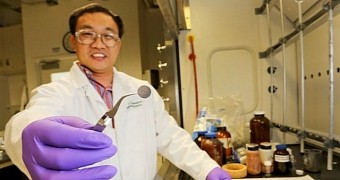Today the scientists at Kansai University announced that they managed to develop a battery based on electrodes drenched in lithium sulfur that has a potential of a 4 or 5 times bigger capacity than existing li-ion batteries.
By combining gold electrolytes in sulfur without getting dissolved, the scientists at Kansai University managed to overcome a major mass production impediment like electrolytes being dissolved by sulfur and built the fundamentals for a much longer lasting battery life for mobile devices.
According HKEPC, Kansai University plans to join forces with big companies that build power sources for mobile devices, and hope to see the new tech being applied to the market in three years from now.
In developing a consumer, mass-production-friendly li-ion battery Kansai scientists found that mixing specific metals, like iron and titanium with sulfur, they can create a small ceramic compound bonding the iron and titanium atoms tightly with the sulfur atoms, reaching a tight 4 to 6 sulfur microparticle composition of a new high sulfur resistant compound.
A new bold chemical design for longer device lives
This new compound can be used afterwards to form a positive electrode inside lithium batteries, having a four to five times more capacity than conventional batteries, but the voltage will be lower.
According to Professor Ishikawa at the Kansai University, the development of the new lithium ion batteries required nano technologies to drill the holes needed for the sulfur to be added inside the electrodes, and cycles of hundreds of charge and discharge effects in order to test the reliability of the new system.
After a prolonged process of fine-tuning the design, the charging time of the prototype batteries has been reduced by 5% and the battery prototype is about 30% sulfur to increase its infiltration potential among the electrodes. The Kansai scientists hope the new battery layout will become quite common in the next five years.

 14 DAY TRIAL //
14 DAY TRIAL //